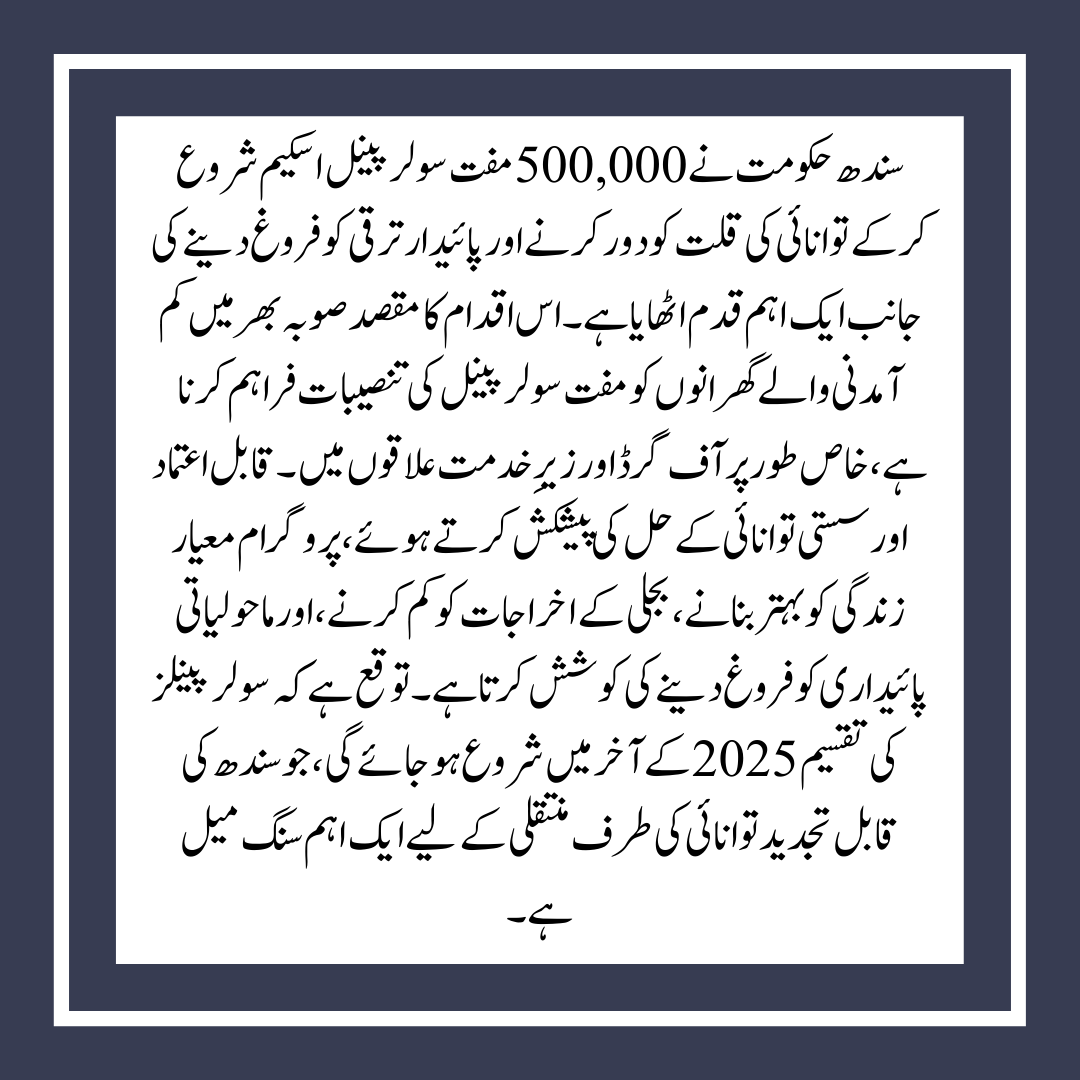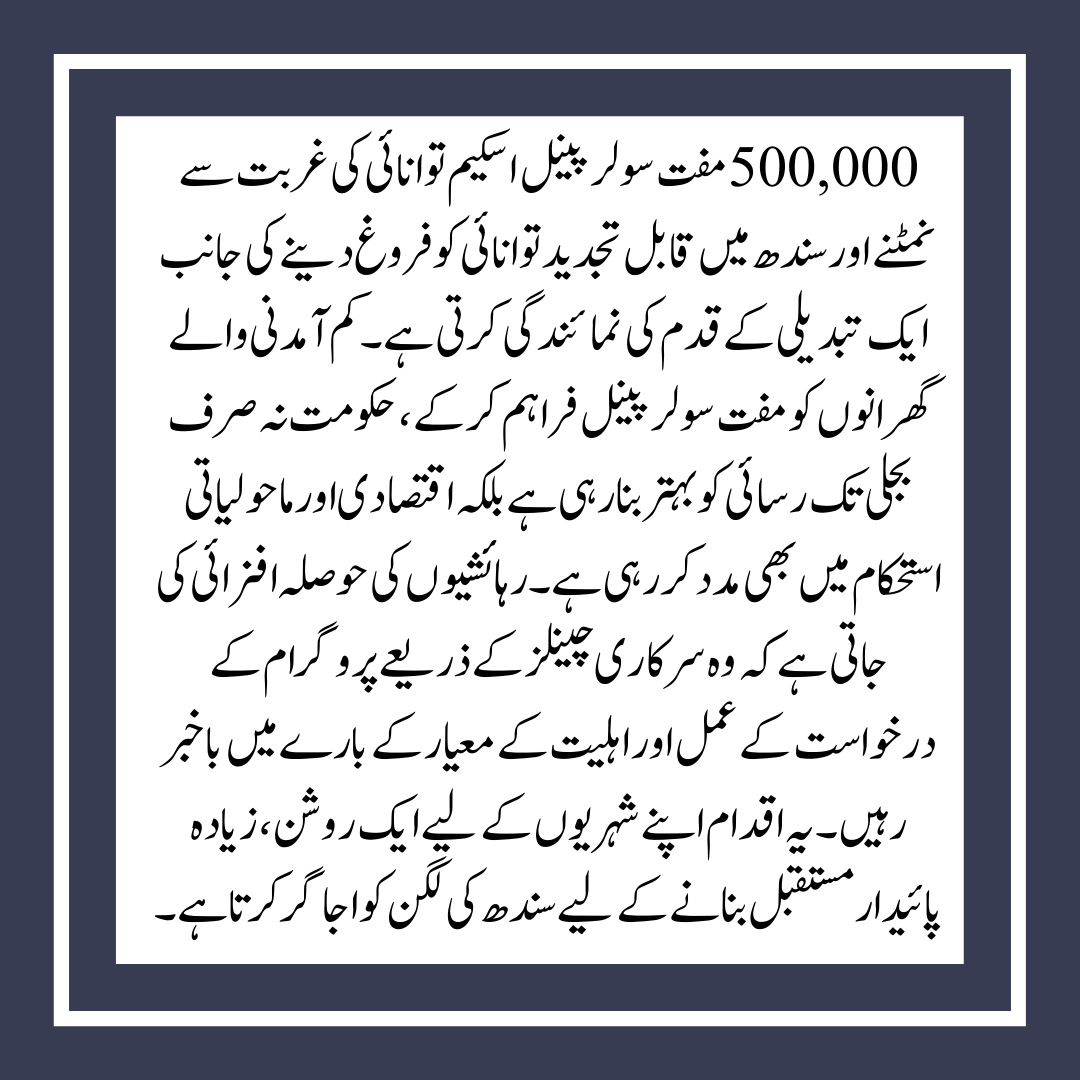Free Solar Panel Scheme:
The Sindh government has taken a groundbreaking step toward addressing energy shortages and promoting sustainable development by launching the 500,000 Free Solar Panel Scheme. This initiative aims to provide free solar panel installations to low-income households across the province, particularly in off-grid and underserved areas. By offering a reliable and affordable energy solution, the program seeks to improve living standards, reduce electricity costs, and promote environmental sustainability. The distribution of solar panels is expected to begin in late 2025, marking a significant milestone in Sindh’s transition to renewable energy.
You may also read: 100000 free Houses via the Apni Chhat Apna Ghar scheme 2025

Key Details of the Free Solar Panel Scheme
| Aspect | Details |
|---|---|
| Program Name | 500,000 Free Solar Panel Scheme |
| Initiated By | Sindh Government |
| Primary Objective | Provide free solar panels to low-income households |
| Number of Beneficiaries | 500,000 families |
| Project Under | Sindh Solar Energy Project (SSEP) |
| Key Goals | Improve energy access in remote areas; Promote renewable energy; Provide economic relief; Support environmental sustainability |
| Implementation Timeline | Delivery expected to start in late 2025 |
| Eligibility Criteria | Low-income households; Off-grid areas; High electricity cost burden |
| Application Process | Application submission via local offices or online; Verification process; Installation scheduling |
| Benefits to Households | Reduced electricity costs; Reliable power supply; Positive environmental impact; Economic empowerment |
| Future Initiatives | Interest-free financing for high-consumption households; Solar integration in flood-prone regions |
| Expected Outcomes | Enhanced energy access, reduced carbon footprint, and improved financial stability for low-income families |
Background of the Solar Panel Scheme
The 500,000 Free Solar Panel Scheme is part of the broader Sindh Solar Energy Project (SSEP), which aims to increase solar power generation and improve access to electricity in underserved regions. The initiative builds on the success of an earlier phase, where 200,000 solar systems were distributed to low-income families. By expanding this program, the Sindh government is addressing the dual challenges of energy poverty and environmental degradation while also reducing the financial burden of high electricity costs on vulnerable households.
You may also read:
Objectives of the Scheme
The primary goals of the 500,000 Free Solar Panel Scheme are:
- Improving Energy Access: The program targets remote and off-grid areas that lack reliable access to the national electricity grid. By providing solar panels, the government aims to bridge the energy gap and ensure that all households have access to power.
- Promoting Renewable Energy: The initiative encourages the use of clean and sustainable energy sources, reducing reliance on fossil fuels and contributing to global efforts to combat climate change.
- Providing Economic Relief: High electricity costs often place a significant financial burden on low-income families. By offering free solar panels, the program helps reduce monthly energy expenses, freeing up resources for other essential needs.
- Supporting Environmental Sustainability: Solar energy is a clean and renewable resource that helps reduce carbon emissions and promotes environmental conservation.
Implementation Timeline
The distribution of solar panels under the scheme is expected to begin in late 2025. The Sindh government is committed to ensuring a transparent and efficient implementation process, with a focus on reaching the most vulnerable communities. The program builds on the lessons learned from the earlier phase, where 200,000 solar systems were successfully installed.
You may also read: CM Orders BoP to Increase Asaan Karobar Scheme Loan Distribution
Eligibility Criteria
While the official eligibility criteria have not yet been finalized, the program is expected to prioritize the following groups:
- Low-income households: Families with limited financial resources will be given priority.
- Off-Grid Areas: Communities that are not connected to the national electricity grid will be the primary beneficiaries.
- High electricity cost burden: households that spend a significant portion of their income on electricity bills will also be considered.
The Sindh Energy Department will release detailed eligibility guidelines closer to the program’s launch.
Application Process
The application process for the 500,000 Free Solar Panel Scheme is expected to involve the following steps:
- Application Submission: Eligible households will be able to submit their applications through local government offices or online platforms.
- Verification Process: Applications will undergo a verification process to confirm eligibility.
- Installation Scheduling: Approved households will be contacted by official service providers to schedule the installation of solar panels.
Residents are encouraged to stay updated on official announcements to ensure they do not miss out on this opportunity.
Benefits of the Solar Panel Scheme
The 500,000 Free Solar Panel Scheme offers numerous benefits to participating households, including:
- Reduced electricity costs: Solar panels provide a cost-effective alternative to traditional electricity, significantly lowering monthly energy expenses.
- Reliable Power Supply: The program ensures a consistent and dependable power supply, particularly in areas prone to frequent blackouts.
- Environmental Impact: By promoting renewable energy, the initiative helps reduce carbon emissions and supports environmental conservation.
- Economic Empowerment: Lower energy costs free up household income, improving overall financial stability and quality of life.
Future Initiatives
The 500,000 Free Solar Panel Scheme is just one component of Sindh’s broader strategy to promote renewable energy. The government is also exploring additional initiatives, such as:
- Interest-Free Financing: High-consumption households may be offered interest-free loans to install solar energy systems.
- Solar Integration in Flood-Prone Areas: Solar panels will be integrated into new housing projects in regions vulnerable to flooding, ensuring access to power even during natural disasters.
These efforts reflect Sindh’s commitment to energy self-sufficiency and sustainable development, setting an example for other provinces to follow.
Conclusion
The 500,000 Free Solar Panel Scheme represents a transformative step toward addressing energy poverty and promoting renewable energy in Sindh. By providing free solar panels to low-income households, the government is not only improving access to electricity but also supporting economic and environmental sustainability. Residents are encouraged to stay informed about the program’s application process and eligibility criteria through official channels. This initiative underscores Sindh’s dedication to creating a brighter, more sustainable future for its citizens.
You may also read: Starting Date and eligibility criteria for Maryam Nawaz 3 Marla Plot Scheme Registration

FAQs:
The 500,000 Free Solar Panel Scheme is available to whom?
Low-income homes, off-grid villages, and families with high power costs are given priority under the program. Nearer to the program’s start, the Sindh Energy Department will give specific qualifying requirements.
How can I submit an application for the free solar panel program?
Applications will probably be submitted online or through local government offices as part of the application procedure. Official service providers will arrange solar panel installations for qualified applicants following a verification process.
When will the installation of solar panels start?
It is anticipated that the 500,000 solar panel systems will begin to be delivered and installed in late 2025. This comes after a fruitful first phase in which 200,000 solar systems were given to worthy families.
